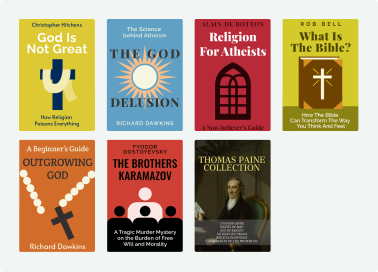The best 7 Atheism books


What's God Is Not Great about?
God is Not Great traces the development of religious belief from the earliest, most primitive ages of humankind through to today. It attempts to explain the dangerous implications of religious thought and the reasons why faith still exists today. It also helps explain why scientific theory and religious belief can never be reconciled.
Who should read God Is Not Great?
- Those who want to know how religions developed
- Anyone who wants to understand the fight between religious and scientific thinking
- Those who wish to see the negative aspects of religious belief

What's The God Delusion about?
The God Delusion (2006) deconstructs the most popular arguments and reasoning for the existence of God to show the statistical and logical improbability of a higher being’s actual existence. These blinks explain why religion shouldn’t be the foundation for society’s morals and how it can actually be harmful to our ethical standards.
Who should read The God Delusion?
- Anyone interested in religion or philosophy
- Agnostics and atheists who want solid arguments to back up their beliefs

Religion for Atheists
What's Religion for Atheists about?
Religion for Atheists (2012) sheds light on the often-overlooked positive aspects of organized religion. By considering religion in absence of a belief in divine beings, we find many valuable social initiatives and philosophical lessons from which even the most cynical among us might benefit.
Who should read Religion for Atheists?
- Believers interested in seeing their religion from a different perspective
- Non-believers looking for new ways to find depth in everyday life
- Those interested in what organizations can learn from religions

What Is the Bible?
What's What Is the Bible? about?
What Is the Bible? (2017) takes a fresh look at the best-selling book of all time: the Holy Bible. These blinks take the Bible for what it is – a conglomeration of books written by real people in real historical contexts that are at once subversive, timeless and transformative.
Who should read What Is the Bible??
- Christians and non-Christians interested in learning about the Bible
- Those who have left the Church
- People with a negative view of religion who are open to new perspectives

What's Outgrowing God about?
Outgrowing God (2019) shows us why we should all be atheists. Revealing how holy books such as the Bible are full of untruths and historical inaccuracies, Richard Dawkins argues that we can’t take these books seriously, nor should we rely on them for moral guidance. To explain all the awesome complexity and improbability of living things, we should look to science, and specifically to the process of evolution. It is evolution, by way of natural selection, that gave rise to us and other living creatures from the bottom up.
Who should read Outgrowing God?
- Agnostics who are uncertain whether to believe in God or not
- Religious people who want to understand atheism
- Atheists seeking a better grasp on arguments against believing in God

What's The Brothers Karamazov about?
The Brothers Karamazov (1879) follows the events, machinations, and tragedies of the Karamazov family over the course of four critical days in an unnamed town in Russia. As tensions within the household simmer and seeth into a stunning climax, we are treated to one of the most penetrating explorations of religion, faith, and doubt in all of world literature.
Who should read The Brothers Karamazov?
- Anyone interested in deep themes like philosophy and religion
- Agnostics looking for spiritual guidance
- People who don’t have time to read a 900-page novel

The Age of Reason
What's The Age of Reason about?
Published in 1794, "The Age of Reason" is a thought-provoking book that challenges traditional religious beliefs and advocates for reason and rational thinking. Thomas Paine critiques organized religion and presents his arguments for a more secular society, emphasizing the importance of individual freedom and critical thinking. This influential work continues to spark debates about faith, reason, and the role of religion in society.
Who should read The Age of Reason?
- Individuals questioning traditional religious beliefs
- People interested in the historical context of the American Revolution
- Readers seeking a rational approach to understanding spirituality and philosophy
Related Topics
Atheism Books
FAQs
What's the best Atheism book to read?
What are the Top 10 Atheism books?
- God Is Not Great by Christopher Hitchens
- The God Delusion by Richard Dawkins
- Religion for Atheists by Alain de Botton
- What Is the Bible? by Rob Bell
- Outgrowing God by Richard Dawkins
- The Brothers Karamazov by Fyodor Dostoyevsky
- The Age of Reason by Thomas Paine
Who are the top Atheism book authors?
- Christopher Hitchens
- Richard Dawkins
- Alain de Botton
- Rob Bell
- Richard Dawkins